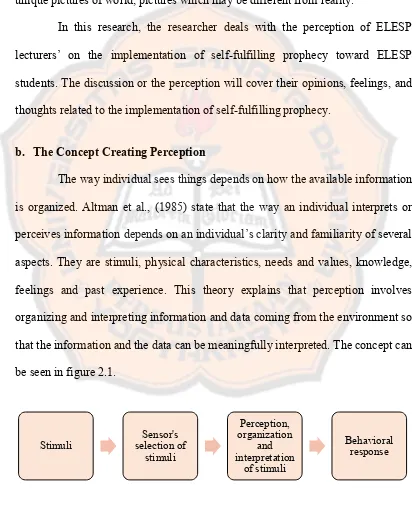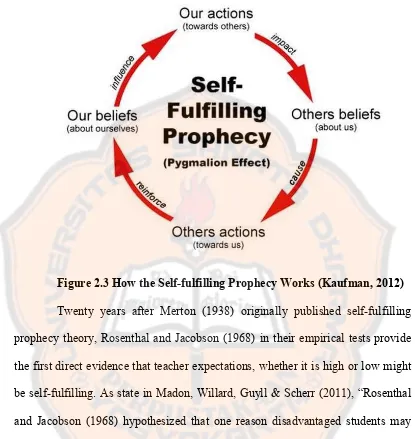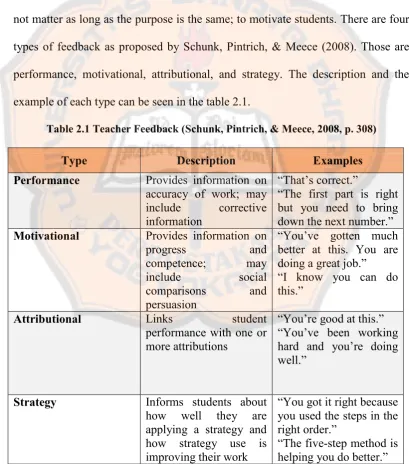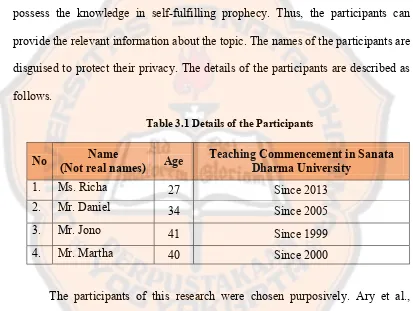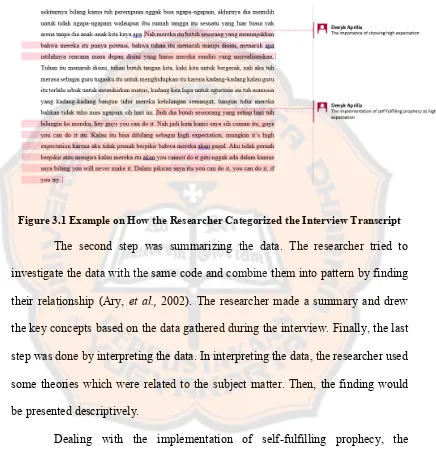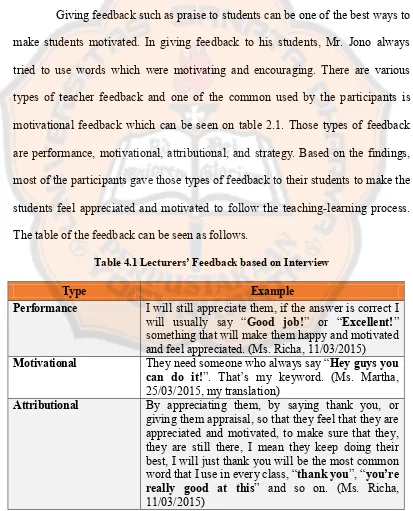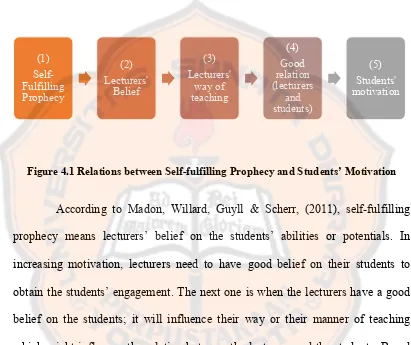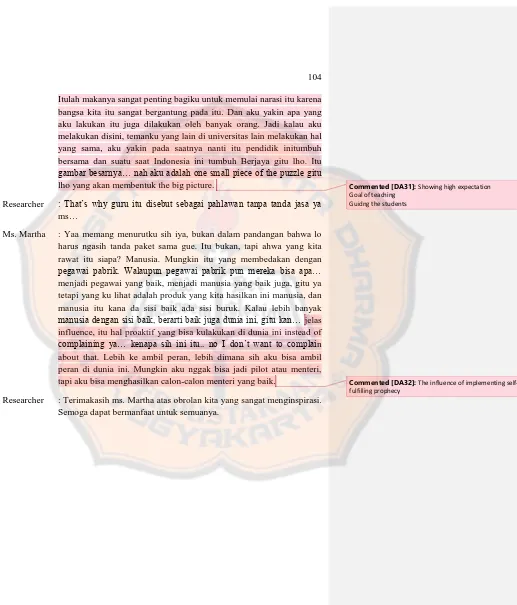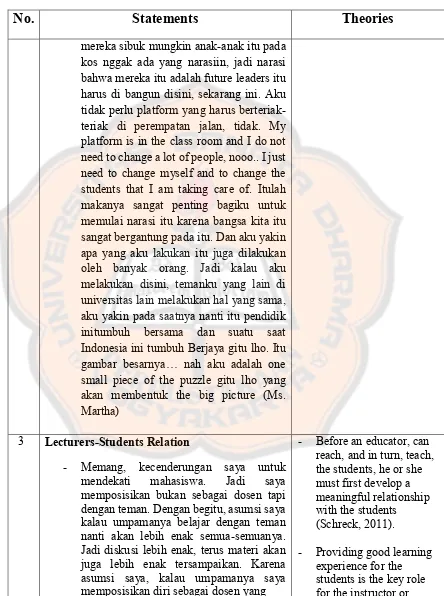vii
ABSTRACT
Kartikawati, D.A.
(2015).
Lecturers’ Perception on Self
-Fulfilling Prophecy in
the English Language Education Study Program
.
Yogyakarta: Sanata Dharma
University.
Sometimes students are lack of confidence in their potentials to reach
success. It becomes
lecturers’ responsibility to convince the students on their
potentials. Implementing self-fulfilling prophecy o
r showing lecturers’
expectation can be an alternative strategy.
Lecturers’ expectation is essential to
the students’ confidence. Lecturers’
expectation, whether it is low or high,
becomes self-fulfilling prophecy. The researcher would like to investigate this
topic more because there are not many studies which discuss self-fulfilling
prophecy, especially in Sanata Dharma University. Moreover, there are still many
aspects which can be explored on the implementation of self-fulfilling prophecy
based on lecturers’ perception as an educator.
In this research, there were two research problems: 1). What are the
lecturers’ perceptions on self
-
fulfilling prophecy in relation to students’
motivation? 2). To what extent do self-fulfilling prophecy understandings
influence ELESP’s ways of teaching?
This research used qualitative approach. The participants of this research
were four lecturers of Sanata Dharma University Yogyakarta who implemented
self-fulfilling prophecy on how the way they teach. This research used
semi-structured interview as a data gathering technique.
For the first research problem, it can be concluded that all of the
participants implemented self-fulfilling prophecy in a positive way. Based on the
interview, the purpose of implementing self-fulfilling prophecy is either to make
the students be on track on their lesson or to make the students feel appreciated
and trusted. Self-fulfilling prophecy is implemented in a form of delivering high
expectation communication to their students
to increase students’ motivation in
learning. From the second research question, it can be seen that implementing
self-fulfilling prophecy really influences their way of teaching. When lecturers
believe i
n the students’ potentials,
they will find a way to make the students
achieve what the lecturers expect on them.
To conclude, the implementation of self-fulfilling prophecy is needed and
beneficial in encouraging students’ motivation in learning although each of
the
lecturer has different way of teaching. Then, as recommendation, this research can
be used to conduct another research related to this topic and as references in
implementing self-fulfilling prophecy.
viii
ABSTRAK
Kartikawati, D.A.
(2015).
Lecturers’ Perception on Self
-Fulfilling Prophecy in
the English Language Education Study Program. Yogyakarta: Universitas Sanata
Dharma.
Mahasiswa sering kali merasa kurang percaya diri terhadap potensi yang
mereka punya untuk meraih kesuksesan. Hal itu menjadi tugas bagi seorang
dosen untuk meyakinkan mahasiswa pada potensi yang mereka punya.
Mengimplementasi
self-fulfilling prophecy
mungkin bisa menjadi salah satu
stategi. Ekspektasi dosen penting untuk kepercayaan diri siswa. Ekspektasi dosen,
tinggi ataupun rendah, menjadi
self-fulfilling prophecy
. Peneliti ingin meneliti
topik ini karena tidak banyak penelitian yang meneliti mengenai
self-fulfilling
prophecy
, khususnya di Universitas Sanata Dharma. Terlebih lagi, masih banyak
aspek yang bisa digali dalam penerapan
self-fulfilling-prophecy
berdasarkan
persepsi dosen sebagai seorang pendidik.
Dalam penelitian ini, ada dua rumusan masalah: 1). Apa persepsi dosen
mengenai
self-fulfilling prophecy
yang berkaitan dengan motivasi siswa? 2).
Sejauh mana pemahaman
self-fulfilling prophecy
mempengaruhi cara mengajar
dosen ELESP?
Penelitian ini menggunakan pendekatan kualitatif. Partisipan dalam penelitian
ini adalah empat dosen dari program pendidikan bahasa inggris Universitas
Sanata Dharma Yogyakarta yang mengimplementasikan
self-fulfilling prophecy
di dalam cara mereka mengajar. Penelitian ini menggunakan wawancara dalam
bentuk semi-terstruktur sebagai instrument penelitian.
Untuk rumusan masalah pertama, dapat disimpulkan bahwa semua partisipan
mengimplementasikan
self-fulfilling prophecy
dalam hal yang positif.
Berdasarkan wawancara, tujuan dalam pengimplementasian
self-fulfilling
prophecy
adalah untuk membuat mahasiswa tetap berada pada jalur pelajaran
maupun membuat mahasiswa merasa dihargai dan dipercaya.
Self-fulfilling
prophecy
diterapkan dalam bentuk pengomunikasian ekspektasi tinggi terhadap
mahasiswa yang bertujuan untuk meningkatkan motivasi mahasiswa dalam
pembelajaran. Untuk rumusan masalah kedua, dapat dilihat bahwa
pengimplementasian
self-fulfilling prophecy
sangat berpengaruh terhadap cara
mengajar dosen. Ketika dosen percaya terhadap potensi yang dimiliki mahasiswa
maka dosen tersebut akan mencari cara untuk membuat mahasiswa mencapai
pencapaian seperti yang diharapkan.
Sebagai kesimpulan, implementasi
self-fulfilling prophecy
adalah hal yang
dibutuhkan dan penting dalam meningkatkan motivasi siswa meskipun setiap
dosen mempunyai cara mengajar yang berbeda. Sebagai rekomendasi, penelitian
ini dapat digunakan untuk mengadakan penelitian lain terkait topik tersebut dan
sebagai referensi dalam mengimplementasikan
self-fulfilling prophecy.
i
LECTURERS’
PERCEPTION ON SELF-FULFILLING
PROPHECY IN THE ENGLISH LANGUAGE
EDUCATION STUDY PROGRAM
A SARJANA PENDIDIKAN THESIS
Presented as Partial Fulfillment of the Requirements
to Obtain the Sarjana Pendidikan Degree
in English Language Education
By
Denyk Aprilia Kartikawati
Student Number: 111214084
ENGLISH LANGUAGE EDUCATION STUDY PROGRAM
DEPARTMENT OF LANGUAGE AND ARTS EDUCATION
FACULTY OF TEACHERS TRAINING AND EDUCATION
SANATA DHARMA UNIVERSITY
YOGYAKARTA
iv
“I W Y
I
I
I I ’
”
–
Nelson Mandela
v
STATEMENT OF WORK’S ORIGINALITY
I honestly declare that this thesis, which I have written, does not contain the work
or parts of the work of other people, except those cited in the quotations and the
references, as a scientific paper should.
Yogyakarta, July 29, 2015
The writer,
vi
PERNYATAAN PERSETUJUAN PUBLIKASI
LEMBAR PERNYATAN PERSETUJUAN PUBLIKASI KARYA ILMIAH
UNTUK KEPENTINGAN AKADEMIS
Yang bertanda tangan di bawah ini, saya mahasiswa Universitas Sanata Dharma:
Nama
: Denyk Aprilia Kartikawati
Nomor Mahasiswa
: 111214084
Demi pengembangan ilmu pengetahuan, saya memberikan kepada Perpustakaan
Universitas Sanata Dharma karya ilmiah saya yang berjudul:
LECTURERS’ PERCEPTION ON SELF-FULFILLING
PROPHECY IN THE ENGLISH LANGUAGE
EDUCATION STUDY PROGRAM
beserta perangkat yang diperlukan (bila ada). Dengan demikian, saya memberikan
kepada Universitas Sanata Dharma hak untuk menyimpan, mengalihkan dalam
bentuk media lain, mengelolanya dalam bentuk pangkalan data, mendistribusikan
secara terbatas, dan mempublikasikannya di internet atau media lain untuk
kepentingan akademis tanpa perlu minta ijin dari saya maupun memberikan
royalti kepada saya selama tetap mencantumkan nama saya sebagai penulis.
Demikian pernyataan ini saya buat dengan sebenarnya.
Dibuat di Yogyakarta
Pada tanggal: 29 Juli 2015
Yang menyatakan
vii
ABSTRACT
Kartikawati, D.A.
(2015).
Lecturers’ Perception on Self
-Fulfilling Prophecy in
the English Language Education Study Program
.
Yogyakarta: Sanata Dharma
University.
Sometimes students are lack of confidence in their potentials to reach
success. It becomes
lecturers’ responsibility to convince the students on their
potentials. Implementing self-fulfilling prophecy o
r showing lecturers’
expectation can be an alternative strategy.
Lecturers’ expectation is essential to
the students’ confidence. Lecturers’
expectation, whether it is low or high,
becomes self-fulfilling prophecy. The researcher would like to investigate this
topic more because there are not many studies which discuss self-fulfilling
prophecy, especially in Sanata Dharma University. Moreover, there are still many
aspects which can be explored on the implementation of self-fulfilling prophecy
based on lecturers’ perception as an educator.
In this research, there were two research problems: 1). What are the
lecturers’ perceptions on self
-
fulfilling prophecy in relation to students’
motivation? 2). To what extent do self-fulfilling prophecy understandings
influence ELESP’s ways of teaching?
This research used qualitative approach. The participants of this research
were four lecturers of Sanata Dharma University Yogyakarta who implemented
self-fulfilling prophecy on how the way they teach. This research used
semi-structured interview as a data gathering technique.
For the first research problem, it can be concluded that all of the
participants implemented self-fulfilling prophecy in a positive way. Based on the
interview, the purpose of implementing self-fulfilling prophecy is either to make
the students be on track on their lesson or to make the students feel appreciated
and trusted. Self-fulfilling prophecy is implemented in a form of delivering high
expectation communication to their students
to increase students’ motivation in
learning. From the second research question, it can be seen that implementing
self-fulfilling prophecy really influences their way of teaching. When lecturers
believe i
n the students’ potentials,
they will find a way to make the students
achieve what the lecturers expect on them.
To conclude, the implementation of self-fulfilling prophecy is needed and
beneficial in encouraging students’ motivation in learning although each of
the
lecturer has different way of teaching. Then, as recommendation, this research can
be used to conduct another research related to this topic and as references in
implementing self-fulfilling prophecy.
viii
ABSTRAK
Kartikawati, D.A.
(2015).
Lecturers’ Perception on Self
-Fulfilling Prophecy in
the English Language Education Study Program. Yogyakarta: Universitas Sanata
Dharma.
Mahasiswa sering kali merasa kurang percaya diri terhadap potensi yang
mereka punya untuk meraih kesuksesan. Hal itu menjadi tugas bagi seorang
dosen untuk meyakinkan mahasiswa pada potensi yang mereka punya.
Mengimplementasi
self-fulfilling prophecy
mungkin bisa menjadi salah satu
stategi. Ekspektasi dosen penting untuk kepercayaan diri siswa. Ekspektasi dosen,
tinggi ataupun rendah, menjadi
self-fulfilling prophecy
. Peneliti ingin meneliti
topik ini karena tidak banyak penelitian yang meneliti mengenai
self-fulfilling
prophecy
, khususnya di Universitas Sanata Dharma. Terlebih lagi, masih banyak
aspek yang bisa digali dalam penerapan
self-fulfilling-prophecy
berdasarkan
persepsi dosen sebagai seorang pendidik.
Dalam penelitian ini, ada dua rumusan masalah: 1). Apa persepsi dosen
mengenai
self-fulfilling prophecy
yang berkaitan dengan motivasi siswa? 2).
Sejauh mana pemahaman
self-fulfilling prophecy
mempengaruhi cara mengajar
dosen ELESP?
Penelitian ini menggunakan pendekatan kualitatif. Partisipan dalam penelitian
ini adalah empat dosen dari program pendidikan bahasa inggris Universitas
Sanata Dharma Yogyakarta yang mengimplementasikan
self-fulfilling prophecy
di dalam cara mereka mengajar. Penelitian ini menggunakan wawancara dalam
bentuk semi-terstruktur sebagai instrument penelitian.
Untuk rumusan masalah pertama, dapat disimpulkan bahwa semua partisipan
mengimplementasikan
self-fulfilling prophecy
dalam hal yang positif.
Berdasarkan wawancara, tujuan dalam pengimplementasian
self-fulfilling
prophecy
adalah untuk membuat mahasiswa tetap berada pada jalur pelajaran
maupun membuat mahasiswa merasa dihargai dan dipercaya.
Self-fulfilling
prophecy
diterapkan dalam bentuk pengomunikasian ekspektasi tinggi terhadap
mahasiswa yang bertujuan untuk meningkatkan motivasi mahasiswa dalam
pembelajaran. Untuk rumusan masalah kedua, dapat dilihat bahwa
pengimplementasian
self-fulfilling prophecy
sangat berpengaruh terhadap cara
mengajar dosen. Ketika dosen percaya terhadap potensi yang dimiliki mahasiswa
maka dosen tersebut akan mencari cara untuk membuat mahasiswa mencapai
pencapaian seperti yang diharapkan.
Sebagai kesimpulan, implementasi
self-fulfilling prophecy
adalah hal yang
dibutuhkan dan penting dalam meningkatkan motivasi siswa meskipun setiap
dosen mempunyai cara mengajar yang berbeda. Sebagai rekomendasi, penelitian
ini dapat digunakan untuk mengadakan penelitian lain terkait topik tersebut dan
sebagai referensi dalam mengimplementasikan
self-fulfilling prophecy.
ix
ACKNOWLEDGEMENTS
I would like to express my greatest gratitude to
Allah SWT
for giving me
this wonderful life and for blessing me in every step I take. This thesis would not
be accomplished without God’s guidance and strength.
My greatest gratitude also goes to
Paulus Kuswandono, Ph.D.
as my
advisor. I thank him for his guidance and assistance during the process, his
willingness to spend his time reading and correcting my thesis, and also his advice
as an encouragement from the beginning until the accomplishment of this thesis.
My sincere gratitude goes to
Fidelis Chosa Kastuhandani, M.Hum
as
my academic advisor for his four year guidance. Next, I would like to convey my
appreciation to four ELESP lecturers for sharing their teaching experience and
sharing their valuable knowledge as my participants. My gratitude also goes to
Maria Septiyani, M.Hum.
,
Drs. Barli Bram, M.Ed., Ph.D., Mr. Erick
and
Alyxia Sukmaadi, S.Pd., A.Md.,
who have been my thesis proofreaders. I thank
them for giving me some meaningful advices, help, kindness and support during
the accomplishment of this thesis.
My special gratitude goes to my beloved parents,
Budi Gunanta
and
Hartati, S.Pd.
who always supported me financially and emotionally to study in
ELESP. I also thank my sister
Devita Putri Sarawati
for always helping me and
giving me support to finish this thesis. I thank all of my family for their truly and
endless love, care, prayers that always support and give strength to me in every
x
My gratitude also goes especially for
Michael Yohanes Berchmans Gilly
for his love, trust, prayers and support. I thank him for always giving me strength,
courage, and hope in my ups and downs so that I can finish my study. Next, I
would like to thank all of my best friends:
Detta, Danik, Ima, Tika, Risma
and
Retno
for the friendship, support, smiles and comfort for more than ten years and
of course still counting. The love and togetherness we shared and give to each
other will always remain in my heart forever.
I am also extremely grateful to have such wonderful friends like
Roza,
Shasha, Riri
and
Leo
as
ROYALS family
for giving me support from the
beginning. I would also thank all of friends in PBI 2011 especially class B for all
amazing moments, team works, and friendship we shared. My thanks also go to
Sri, Cinde, Joko, Monic, Gaiety, Heni, Ocha, Vivin
and
Philip
for their support
while we were struggling together throughout our unforgettable years at ELESP
of Sanata Dharma University.
Finally, the last gratitude I give to everyone whose names cannot be
mention one by one. I would never forget to thank them for everything they had
done for me. May God bless them all.
xi
TABLE OF CONTENTS
TITLE PAGE
... i
APPROVAL PAGES
... ii
DEDICATION
... iv
STATEMENT OF WORK’S ORIGINALITY
... v
PERNYATAAN PERSETUJUAN PUBLIKASI
... vi
ABSTRACT
... vii
ABSTRAK
... viii
ACKNOWLEDGEMENTS
... ix
TABLE OF CONTENTS
... xi
LIST OF TABLES
... xiv
LIST OF FIGURES
... xv
LIST OF APPENDICES
... xvi
CHAPTER I. INTRODUCTION
A.
Research Background... 1
B.
Research Problems ... 4
C.
Research Limitation ... 5
D.
Research Objectives ... 5
E.
Research Benefits ... 6
F.
Definition of Terms ... 8
CHAPTER II. REVIEW OF RELATED LITERATURE
A.
Review of Related Studies ... 12
B.
Theoretical Description ... 13
1.
Perception ... 13
a.
Definition of Perception ... 13
b.
The Concept Creating Perception ... 14
xii
2.
Self-Fulfilling Prophecy ... 17
3.
Motivation ... 22
4.
Lecturer or Learning Facilitator ... 28
C.
Theoretical Framework ... 32
CHAPTER III. RESEARCH METHODOLOGY
A.
Research Method ... 35
B.
Research Participants ... 36
C.
Research Setting ... 38
D.
Instruments and Data Gathering Technique ... 39
E.
Data Analysis Technique ... 41
F.
Research Procedure ... 43
CHAPTER IV. RESEARCH FINDINGS AND DISCUSSION
A.
Lecturers’ Perception on the I
mplementation of Self-Fulfilling Prophecy .. 45
1.
The
Lecturers’
Concept of Self-Fulfilling Prophecy ... 45
2.
Lecturer
s’ Role in Implementing
Positive Self-Fulfilling Prophecy .. 49
a.
Guiding Students ... 49
b.
Increasing
Students’
Motivation ... 50
c.
Showing High Expectation ... 54
3.
Lecturers-Students Relation ... 55
4.
Lecturer
’s
Beliefs ... 57
B.
The Influence of Implementing Self-Fulfilling Prophecy i
n Lecturers’
Ways of Teaching ... 60
1.
Creating a Warm and Friendly Environment ... 63
2.
Providing Students with Opportunities to Develop Their Skills . 64
3.
Providing Students with Opportunities to Practice Their Skills .. 65
4.
Providing Students with Performance-Based Feedback ... 67
xiii
B.
Suggestions ... 72
REFERENCES
... 75
xiv
LIST OF TABLES
2.1 Teacher Feedback (Schunk, Pintrich, & Meece, 2008, p. 308) ... 24
3.1 Details of the Participants ... 37
xv
LIST OF FIGURES
2.1 The Perceptual Process (Altman et al., 1985, p. 86) ... 14
2.2 How the Self-Fulfilling Prophecy Works (Kaufman, 2012) ... 19
3.1 Example on How the Researcher Categorized the Interview Transcript ... 42
xvi
LIST OF APPENDICES
Appendix A. Permission Letters ... 79
Appendix B. List of Questions ... 84
Appendix C. Example of Interview Transcript (Coding Process) ... 85
1
CHAPTER I
INTRODUCTION
This chapter elaborates six essential parts of this study. They are the
research background, the research problems, the problem limitation, the research
objectives, the research benefits, and the definitions of terms. The first part of this
research, which is the research background, contains the topic of the discussion
and the reason of choosing the topic. Then the second part is the research
problems which contain the problems that are going to be discussed in the
research. The third is the problem limitation. In this part, the readers will find the
scope of this research related to the previous part, which are the research
problems. In the research objectives, the researcher states the purposes of the
research. The next part of this research is the research benefits. This part talks
about the benefits for the readers and the other researchers. The last part of this
research is the definition of terms. In this part, the researcher explains some
keywords that are used in the research in order to avoid misunderstanding and
misinterpretation.
A.
Research Background
A teaching process is a complex activity. Moreover, the subject that
should be taught is English. Becoming a good English lecturer is not easy since
English is a foreign language in Indonesia. The problem which usually arises in
not have any confidence to improve their English skills because of certain reasons.
This happens also in the English Language Education Study Program (ELESP)
students of Sanata Dharma University. The researcher had an informal interview
with some ELESP lecturers. Lecturers and teachers are actually the same. What
makes them different is that the
‘
lecturer
’
term is usually used by university
students while
‘
teacher
’
term is usually used by students in school. However, in
this research the term that is used is ‘lecturer’ because the scope of the research is
about lecturers’
belief in self-fulfilling prophecy and the influence of the belief on
the way lecturer teaches.
B
ased on the researcher’s personal experience
in getting along with the
lect8urers of the English Education Study Program, a number of students had
relatively low confidence in their potentials. This may be the result from their
feelings of having low potentials. On the other hand, there is a strategy that
lecturers need to do, namely showing their belief or expectation to students about
their potentials or implementing self-fulfilling prophecy.
Lecturers’ expectation,
whether it is high or low, becomes a self-fulfilling prophecy. Research on second
and foreign language learning suggests the expectations that teachers form for
their students can often have an impact on students’ behavior
and achievement
(Tsiplakides & Keramida, 2010). Some teachers tend to convey differential
expectations to students, which appear to have self-fulfilling prophecy effects on
them. Meanwhile, as an educator, showing his or her beliefs to the students can be
claims that self-fulfilling prophecy is a feeling when students would like to prove
that they can do everything better as what the lecturers expect. Thus, it is believed
that the way lecturer thinks and acts
really gives impact of students’ behavior.
Self-fulfilling prophecy is needed in language learning. It is because the
students have been shown to achieve more when they believe in their lecturers and
society puts a high expectation on them. Schunk, Pintrich, & Meece (2008)
confirm that it is important for the lecturers to show their beliefs or expectations
to the students because it influences
students’ motivation in learning. Since it has
a significant role in teaching learning process, the lecturers also have an important
role to make the students feel appreciated and trusted by their lecturers. In the
relation to self-fulfilling prophecy, when students feel appreciated and trusted then
the students’ motivation
will increase automatically. Moreover, Rosenthal and
Jacobson (1968) state that when teachers expect that certain children have good
performance in learning, the students will have good performance in learning. It
means that when students are accustomed to obtaining the communication of high
expectation from the teacher, then their motivation to learn will increase
automatically.
In the educational scene, Schunk, Pintrich, & Meece (2008) state that the
teacher has primary responsibility to develop, encourage, enhance, and maintain
motivation in the students. Therefore, the way teachers conduct their classrooms is
a major factor directing students' motivation. In addition, Madon, Willard, Guyll
and Scherr (2011) add
that believing in the students’ abilities might influence the
The researcher is interested in this topic because as a teacher candidate, it
is important to find such an alternative strategy which can be applied in the future.
It is widely known that every strategy which is implemented by lecturer has its
own purpose either encouraging
students’ motivation or improving students’
performance. One of the strategies is by implementing self-fulfilling prophecy. As
one of the alternative strategies, there are still many aspects of things which can
be explored on the implementation of self-fulfilling prophecy. Moreover, the
researcher would like to investigate more since there are not many studies about
self-fulfilling prophecy, especially in Sanata Dharma University. Thus, the
researcher would like to analyze whether self-fulfilling prophecy implementation
really has its role in the teaching-
learning process based on lecturers’
understanding. Since the researcher will graduate from the English Language
Education Study Program (ELESP) of Sanata Dharma University as a teacher
candidate, the researcher would like
to know the lecturers’
perceptions of ELESP
about the self-fulfilling prophecy implementation on the way they teach.
B.
Research Problems
This research aims to answer two research problems in order to present the
result of survey on the importance of having self-fulfilling prophecy among
lecturers in Sanata Dharma University. They are stated into two questions below:
1.
What are the
lecturers’ perceptions on
self-fulfilling prophecy in relation
2.
To what extent do self-fulfilling prophecy understandings influence
ELESP
lecturers’
ways of teaching?
C.
Research Limitation
In order to enable in-depth study, the scope of the study has to be
narrowed by some limitations. Firstly, this research focuses on lecturers’
understandings as perceptions on providing self-fulfilling prophecy. The
researcher would like to analyze whether self-fulfilling prophecies, especially the
positive one, is really useful in
encouraging students’ confidence or
increasing
stude
nts’ motivation
based
on lecturer’s
perceptions.
Secondly, the research focuses on whether the lecturers’
perceptions
influence the way lecturers teach
. The result or the students’ achievements are not
covered in this research because the researcher only would like to analyze the
lecturers’
perceptions on having self-fulfilling prophecy as a lecturer. Although
this research addresses
lecturers’ expectation
, the researcher does not discuss
students’ awarenes
s given the expectation. Moreover, even the st
udents’
awareness of the lectu
rers’ expectation
is an interesting issue, it is beyond the
scope of this research. However, the researcher might find the negative
implementation on self-
fulfilling prophecy based on the participants’ experience.
D.
Research Objectives
The purpose of the research is to answer the questions stated previously on
perceptions on implementing self-fulfilling prophecy. First, the research is aimed
to find out how lecturers of ELESP give meaning to self-fulfilling prophecy and
whether it is beneficial to impro
ve the students’ motivation to learn based on
ELESP lecturers’
perceptions. Second, the implementation of self-fulfilling
prophecy in class might be different for each lecturer. Thus, the researcher would
like to know to what
extent of lecturers’
perceptions on believing self-fulfilling
prophecy influence the way the lecturer teaches. The researcher might find out
different
lecturers’ experience of teaching
are influenced by self-fulfilling
prophecy from each of the participant. This research also might find out the
problem that could appeare in providing self-fulfilling prophecy toward students.
E.
Research Benefits
This research is expected to give some valuable contributions to all
educational communities, especially for the English education. The researcher
hopes that this research can give an understanding for the readers, especially
English teachers
, English teacher candidates and English learners about lecturers’
perceptions on believing self-fulfilling prophecy. The expected contributions are
presented as follows.
1.
For Faculty of Teachers Training and Education
The finding of the research may be useful for Faculty of Teachers Training
and Education as a consideration in incorporating theories of self-fulfilling
self-fulfilling prophecy can help students as teacher candidates to concern more about
the ways the teacher teach their students in the future. Then, the researcher hopes
they will improve their sense of teaching and become a well-qualified teacher.
Moreover, by knowing the relevance to teacher-student relation and self-fulfilling
prophecy, they will improve their character to be good teachers in the future.
Then, if the findings prove that it is useful for teachers to have self-fulfilling
prophecy, the knowledge of self-fulfilling prophecy can be implemented in the
future.
2.
For Lecturers of English Language Education Study Program
The results of this research hopefully can be a reference for lecturers to
develop and implement self-fulfilling prophecy in ELESP. Moreover, the lecturers
need to see how important it is as an English lecturer to have self-fulfilling
prophecy knowledge. It may be true that the lecturers will find some difficulties
on self-fulfilling prophecy implementation since it is closely related to
lecturers-students relation. However, the lecturers need to realize that having a good
relation with their students is important since the way lecturers teach will
influence the way students perform. Moreover, it is believed that lecturer-student
good relation will also influence the
student’s
motivation in learning.
Self-fulfilling prophecy may be implemented in different ways by different lecturers
because each of them has different styles of teaching. Hence, lecturers can
consider applying others strategy in implementing Self-fulfilling prophecy so that
3.
For Students of Sanata Dharma University
The findings of this research also hopefully will be beneficial for the
students of Sanata Dharma University, especially for English Language Education
Study Program students as the teacher candidates. The findings may help English
Language Education Study Program (ELESP) students become more motivated in
making a good relation with lecturers since it has significant role in the
teaching-learning process. Moreover, in the future as the teacher candidates, they can
implement self-fulfilling prophecy as the best strategy in conducting the teaching
and learning process. Then, they can improve their stud
ents’ moti
vation or
performance through self-fulfilling prophecy.
4.
For the Future Researchers
The findings of this research hopefully can be used to carry out other
research about self-fulfilling prophecy implementation. The result can also be
used as a reference in conducting further research about the related topic. They
can implement the result to see whether self-fulfilling prophecy is needed to be
improved by lecturers. Then, the future researchers can conduct a research on
self-fulfilling prophecy from different points of view
such as students’ perception on
the implementation of self-fulfilling prophecy.
F.
Definitions of Terms
In analyzing the research, there are some key terms that will be explained
in this section. The objective is to avoid any misinterpretation and
this section carefully defines each concept that will be used in this thesis. The
following key terms are described as follows.
1.
Perceptions
Altman, Valenzi, and Hodgetts (1985) define perceptions as the way
stimuli are selected and grouped by a person so that they can be meaningfully
interpreted. What people think about the
world’s phenomena may be called as
perceptions. In addition, George and Jones (2005) claim the perceptions as the
process by which individual select, organize, and interpret the input from their
senses (vision, hearing, touch, smell, and taste) to give meaning and order to the
world around them.
In this research, the researcher deals with the perceptions of ELESP
lecturers on the implementation of self-fulfilling prophecy toward ELESP
students. Their perceptions cover their opinions, feeling, and thoughts related to
the implementation of self-fulfilling prophecy.
2.
Self-fulfilling Prophecy
Self-fulfilling prophecy is defined as a Pygmalion Effect or Rosenthal
effect. This research is focused on self-fulfilling prophecy which is implemented
in educational area between lecturers and students. Pygmalion effect comes from
the term of self-fulfilling prophecy as Merton (1948) originally states. It means
based on their research, claim
that teacher’s
expectation to the students obviously
can change their behavior in teaching.
Moreover, Madon, Willard, Guyll and Scherr (2011) state that
self-fulfilling
prophecy occurs when a perceiver’s false belief influence how she or he
treats a target (student)
which, in turn, shapes the target’s subsequent behavior in
the direction of the initially false believe. They define self-fulfilling prophecy as
lecturers’ b
eliefs
on the students’ abilities or potentials.
Thus, this research would
like to analyze
the lecturers’ belief in
self-fulfilling prophecy based on the
lecturers’ perception. The perception itself comes from the lecturers’ experience
in delivering self-fulfilling prophecy in the way they are teaching ELESP
students.
3.
Motivation
There are many definitions of motivation that are stated by several
researchers around the world. Motivation as Schunk (as cited in Schunk, Pintrich,
& Meece, 2008, p. 5) state that it is essential to students in the learning process
since it can influence what, when, and how people learn. It will help the students
in achieving the goals of learning because motivation involves goals that must be
achieved. A key point is that motivation bears a reciprocal relation to learning and
performance; that is, motivation influences learning and performance and what
students do and learn will influence their motivation (Pintrich, 2003; Schunk,
1995) as cited in (Schunk, Pintrich, & Meece, 2008, p. 5). Motivation is relevant
to learning because learning is an active process requiring conscious and
the lecturers also need to have a motivation to teach and also increase the
motivation of the students. Moreover, motivation can also be seen as the effect of
the implementation of self-fulfilling prophecy. The researcher would like to
investigate more whether motivation becomes one of the effects of the
self-fulfi
lling prophecy implementation based on lecturers’ experience in teaching.
There are three terms that the researcher used to complete this research.
They are perceptions, self-fulfilling prophecy and motivation. The details of those
12
CHAPTER II
REVIEW OF RELATED LITERATURE
To give a fundamental theory to this research, this chapter presents a
discussion on the related literature as a theoretical base upon which the research
presented in the chapter was conducted. The discussion includes review of the
related theories, the theoretical description, and the theoretical framework.
A.
Review of Related Studies
The researcher found some studies related to this topic. For example,
Brophy (1983) has already conducted his research entitled "Research on the
Self-Fulfilling Prophecy and Teac
her Expectations”. The finding in Brophy’s research
was that delivering expectation to the students was crucial. The teacher
’s
expectation behavior became a self-
fulfilling prophecy; the students’ performance
can come
to reflect the teachers’ belief
about their ability. Related to Brophy’s
(1983) research, this research also seeks to prove the importance of having a
self-fulfilling prophecy based on lecturers’ perception
s.
The next related study is from Suthami (2015) who investigated about
humanistic education implemented in Critical Reading and Writing (CRW) II
class in relation to students’ motivation and characters development. Humanistic
education is actually a part of self-fulfilling prophecy. It is closely related to
students’ motivation and engagement since humanistic education’s goal is to
Suthami (2015) focused on how humanistic education is implemented in CRW II
class based on lecturer’s and students’ journal. However, this research is
only
focused on the implementation and the influence of self-fulfilling prophecy based
on lecturers’ perception
s.
B.
Theoretical Description
The theories which are going to be discussed in this chapter are relevant
since they can either help to solve the research problems or enlarge particular
knowledge of the topic. Those theories consist of theories about the perceptions,
the self-fulfilling prophecy, the motivation and the teacher as a learning facilitator.
1.
Perception
In this section, the researcher provides three parts of discussions about
perception. Those are as follows.
a.
Definition of Perception
In this research, the researcher defines perception based on George and
Jones (2005), who state
that perception is “the process of receiving information
about and making sense of the world around us
” (p.
76). On the other hand,
definition of perception proposed by Altman, Valenzi, & Hodgetts (1985) is the
way stimuli are selected and grouped by a person so that they can be meaningfully
interpreted. The perception deals
with a person’s view of reality
. The process
starts from stimuli that person has chosen. Then the individual sensors select data
sensory message. The message is sent to the brain. Thus, the brain will process the
message into feeling. Finally, the brain continues to interpret feeling into
perception. In conclusion, perception deals with cognitive process which produces
unique pictures of world, pictures which may be different from reality.
In this research, the researcher deals with the perception of ELESP
lecturers’ on the implementation of
self-fulfilling prophecy toward ELESP
students. The discussion or the perception will cover their opinions, feelings, and
thoughts related to the implementation of self-fulfilling prophecy.
b.
The Concept Creating Perception
The way individual sees things depends on how the available information
is organized. Altman et al., (1985) state that the way an individual interprets or
perceives information depends on an individual’s clarity and familiarity of several
aspects. They are stimuli, physical characteristics, needs and values, knowledge,
feelings and past experience. This theory explains that perception involves
organizing and interpreting information and data coming from the environment so
that the information and the data can be meaningfully interpreted. The concept can
[image:32.595.98.517.203.708.2]be seen in figure 2.1.
Figure 2.1 The Perceptual Process (Altman et al., 1985, p.86)
Stimuli
Sensor's
selection of
stimuli
Perception,
organization
and
interpretation
of stimuli
c.
Factors Influencing Perception
As described by Altman et al. (1985), there are four important factors
influencing an individual’s perception.
They are: (1) selection of stimuli, (2)
organization of stimuli, (3) the situation, and (4)
the person’s self
-concept.
1)
Selection of Stimuli
A person focuses only on a small number of all stimuli which he or she is
surrounded. This process is known as selection. Each individual specific cues and
filters, or screens, out the others (Altman et al., 1985). The same situation or
stimuli may produce very different reactions or behaviors because each individual
has his or her own unique filter. That is why an individual can perceive their life
differently.
The way people select the stimuli are influenced by various external and
internal factors. The external factors come from outside environmental influences
such as intensity, size, contrast, repetition, motion, novelty and familiarity.
Whereas,
the internal factors come from individual’s complex psychology
makeup. People will select the stimuli or situations from environment with their
learning, motivation, and personality.
2)
Organization of Stimuli
A second factor which is influencing perceptions is organization. After
the information has been selected, it must be arranged in order to become
meaningful. This second factor of influencing perception focuses on what takes
received. Therefore, the mind tries to bring order out of the unarranged sensory
data by selecting certain items and putting them together in a meaningful way
based on experience (Altman et al., 1985). Therefore, the arrangement of stimuli
affects people’s
perceptions.
3)
The Situation
Another factor influencing perception is the situation. Altman et al.
(1985) state that the way people perceive life can be affected from their
expectation, situation, and past experience. Moreover, George & Jones (2005)
state
that perceivers’ experience or knowle
dge (schemas) needs and desires
(motivational states) filter information into their perception. It can also be said
that what a person perceives i
s affected by the person’s familiarity and
expectations about situation. Perceiving accurately is related to how well a person
adjusts his or her behavior to a situation (Altman et al., 1985). It can be concluded
that the situation consists of the internal factors which affects the perceivers in
processing their perception.
4)
Self-Concept
A fourth factor which was influencing perceptions is the self-concept.
The self-concept is the way individual feels about and perceives himself. The way
people see themselves affects people’s perception on the world around th
em.
Altman et al., (1985) claim that the self-concept is important since the mental
Based on the explanation about four factors which influence perception,
it can be concluded that every individual has his or her own point of view on
something. The same objects or events can be perceived differently by different
person which leads to different behavioral responses or attitudes. Related to this
research, perception is the way lecturers feel or think and consider about the
implementation of self-fulfilling prophecy on the way they teach ELESP students.
2.
Self-Fulfilling Prophecy
The meaning of this concept is that if we expect something to happen in a
certain way, our expectation will tend to make it so. In the world of education,
between lecturers and students, it can also be found termed, self-fulfilling
prophecy.
Lecturers’ exp
ectation, whether it is high or low, can be defined as
self-fulfillilng prophecy. A number of lecturers tend to convey differential
expectations to students, which appear to have self-fulfilling prophecy effects on
them. The term of self-fulfilling prophecy as Merton (1948) originally states in the
beginning is a false definition of the situation evoking a new behavior which
makes the originally false conception comes true. In other words, the prediction
that were made by a person at the beginning of something will affects that
person’s behavior i
n such way the person makes the prediction happen.
It is also supported by Madon, Willard, Guyll & Scherr (2011), who
explain that self-fulfilling prophecy is a false belief that leads to its own
fulfillment, and it involves three events. First, one person (a perceiver) must hold
self-fulfilling prophecy, a lecturer may underestimate
students’ potentials
, believing
that the students are less capable. Second, the perceiver (lecturer) must treat the
target (student) in the way that matches his or her false belief. For example, a
lecturer who underestimates
students’ ability would have to treat the students as if
he or she lacked ability. In class, the lecturer perhaps not calls the students,
spending only a little time with the students and tracking the students into a low
ability group (Rosenthal, 1973; Smith et al., 1998) as cited in Madon, Willard,
Guyll & Scherr (2011). Third, the target must respond to the treatment he receives
by confirming the false belief. The student who is treated as if he or she lacks
ability must learn less than other students in the class. Thus, “self
-fulfilling
prophecy occurs when a perceiver’s false belief in
fluence how she or he treats a
target which, in turn, shapes the target’s subsequent behavior in the direction of
the initially false bel
ieve” (Madon, Willard, Guyll &
Scherr, 2011, p. 578).
Meanwhile, Kaufman (2012) simplifies the concept of self-fulfilling
prophecy based on Rosenthal and Jacobson (1968) theory with the cycle of how
Figure 2.3 How the Self-fulfilling Prophecy Works (Kaufman, 2012)
Twenty years after Merton (1938) originally published self-fulfilling
prophecy theory, Rosenthal and Jacobson (1968) in their empirical tests provide
the first direct evidence that teacher expectations, whether it is high or low might
be self-fulfilling. As state in Madon, Willard, Guyll &
Scherr (2011), “Rosenthal
and Jacobson (1968) hypothesized that one reason disadvantaged students may
perform more poorly in school than their more advantaged counterparts is because
that is what their teachers expected them to
improve academically”. To test this,
Rosenthal and Jacobson (1968) conducted an exam that supposedly identified
“late blooming” students, or children who were expected to experience substantial
academic improvement in the coming year. Rosenthal and Jacobson chose random
Rosenthal and Jacobson showed both that teachers expected these
students to be more academically successful and that these students in fact learned
more as measured on intelligence tests than did students who had not been
identified as “late bloomers”. Because the subset of students who were designated
as “late bloomers” were chosen randomly, Rosenthal
and Jacobson argue that the
difference in students’ a
chievement between the two groups can be attributed in
changing teacher expectations.
Referring to Schunk, Pintrich, & Meece (2008), Rosenthal and Jacobson
(1968) concluded that teacher expectations can act as self-fulfilling prophecies
because students’ a
chievements come to reflect the expectations. In the other
words, if the teacher believes that the students can reach high levels of
achievements, there is a good chance that the students will be too. However, if the
teacher has low expectations about what level the students can achieve, the
students will probably always remember to these expectations.
According to Madon, Willard, Guyll & Scherr (2011), Rosenthal and
Jacobson (1968) from their past research, state that the teach
ers’ expectation of
their students’ behavior became a self
-fulfilling prophecy. Rosenthal and
Jacobson (1968) state that when teachers expected that certain children would
show greater intellectual development, those children did show greater intellectual
development. It also means that when students are accustomed to obtain
communication of high expectation from the teacher, then their self-fulfilling
prophecy will increase automatically. Self-fulfilling prophecy is feeling when
expects. It happens because a classroom is such a work place for student. It is a
powerful social network, and students’ feeling about both teachers and classmates
have important implications for how much students willing to make an effort to be
successful in learning.
Given the power of lecturers’
expectations, students are expected to
improve their learning and to have potential feelings about themselves. When
lecturers have high expectations for students and provide tasks that are engaging
and of high interest, the students will build self-esteem, increase confidence and
improve academic performance (Brophy, 1983). The s
tudents’ confidence is
critical because it is linked to the
student’s willingness to tackle challenging
learning activities. The students will have their confidence when a teacher uses
high expectation communication to the students. High academic expectations start
and finish with the lecturer
’s beli
ef in every student. The lecturer needs to believe
and show that belief that all students can learn, grow, and get a successful
learning. Then, the students must be sure that their lecturer believes in the
students’ potentials;
they can learn and can do things that are even harder than
they might think they can do. In summary, this self-fulfilling prophecy based on
Rosenthal and Jacobson (2000) who state that:
a)
Teachers form different expectation for their students.
b)
These expectations are communicate to students.
c)
Teachers’ expectations impact, either positively or negatively on students’
Self-fulfilling prophecy obviously relates to the field of educational
psychology and especially is related to the lecturer as a learning facilitator. The
l
ecturers’ expectations for students –
whether high or low- can become a
self-fulfilling prophecy. That is, the students tend to give to lecturers as much or as
little as lecturers expect of them. Therefore, it can be said that when the lecturers
engage in differential treatment of high- and low- expectation students, the
students are aware of these differences. However, this research does not address
the
students’ awarenes
s of the differential treatment.
3.
Motivation
Many researches were conducted to find the correlation between
psychology and education (Madon, Willard, Guyll & Scherr, 2011). Therefore, it
cannot be denied that psychology really affects education from several sides. One
of the examples is the lecturers
’ behavior
can affect students’ motivation in many
ways. Improving self-fulfilling prophecy as a lecturer might affect both the
lecturer and the student
’
s psychology.
Therefore, lecturers need to have skills to motivate the children in order
to have a good achievement. It is now widely known that the motivation
influences the achievement. The relation between self-fulfilling prophecy and
motivation is interesting because motivational psychologists believe that the
variations in self-fulfilling prophecy can cause the variations in achievement
behavior. The need to expect the students to show interest is an example of the
merely committed to stud
ents’ academic
progress. The lecturer should have a
good sufficiently high expectation for what students can achieve.
Meanwhile, one of the characteristics of lecturers having self-fulfilling
prophecy is often giving positive reinforcement or praise to students in order to
motivate students to reach a high level of achievement. If the lecturer gives
enough praise then student’s motivation will
be increased automatically.
Motivation is crucial to students in the learning process. It will help the students
in achieving the goals of learning. When dealing with high expectation for
students’ achievement, lecturer
s tend to give for example more praises like
positive reinforcement, be friendlier to motivate students and give more eye
contact, and pay more attention to students. Reinforcement becomes one of the
verbal communications of high expectation. It is also one of the impacts from the
teacher having self-fulfilling prophecy for the students.
Lecturers
’ expectation can be seen from verbal and non
-verbal
communication (Schunk, Pintrich, & Meece, 2008). The verbal communication
means lecturer directly gives such as positive reinforcement or praise the students,
while the non-verbal communication is more on the lecturer
s’ behavior. For
example, the lecturer gives more eye contact to students, pays more attention to
the students, and a teacher often smiles to the students to show that the teacher
expects something good from the students. These are examples of verbal
communication to praise the students in order to obtain
students’ confidenc
e and
There are many ways t
o encourage students’ confidence
. One of them is
giving praise words as a feedback. For students, especially who find school is
difficult, praise is important. Even when the teacher only says
‘wow’ to the
students’ work, it really give
s meaning to the students. Giving such kind of praise
words like on the list might influence students’ motivation. However, sometimes
the lecturers have different styles
in developing students’ motivation and it
does
not matter as long as the purpose is the same; to motivate students. There are four
types of feedback as proposed by Schunk, Pintrich, & Meece (2008). Those are
performance, motivational, attributional, and strategy. The description and the
[image:42.595.100.510.267.732.2]example of each type can be seen in the table 2.1.
Table 2.1
Teacher Feedback (Schunk, Pintrich, & Meece, 2008, p. 308)
Type
Description
Examples
Performance
Provides information on
accuracy of work; may
include
corrective
information
“That’s correct.”
“The first
part is right
but you need to bring
down the next number.”
Motivational
Provides information on
progress
and
competence;
may
include
social
comparisons
and
persuasion
“You’ve gotten much
better at this. You are
doing a great job.”
“I know you can do
this.”
Attributional
Links
student
performance with one or
more attributions
“You’re good at this.”
“You’ve been working
hard and you’re doing
well.”
Strategy
Informs students about
how
well
they
are
applying a strategy and
how strategy use is
improving their work
“You got it right because
you used the steps in the
right order.”
“The five
-step method is
In the learning process, feedback such as reinforcement is needed to
control the students’ behavior in order to support the learning process. According
to Alberto and Troutman (2002) as quoted by Walker, Shea & Bauer (2007),
positive reinforcement is “the presentation of a desirable reinforce after a behavior
has been exhibited” (p.
65). By accepting reinforcement from the lecturer after
performing some expected behaviors, the students will repeat the behavior and
they will not do bad behaviors or unexpected behaviors which do not support the
English learning process.
According to the law of effect, behavior is determined by its
consequences. Responses become more probable as the result of others.
Meanwhile, Thorndike (1898) derives this principle from his observation of
food-deprived cats placed inside a box with food outside. In the attempts to escape, the
animals would, by accident eventually operate a device that released the door,
allowing the cats to consume the food as (cited in Slavin, 2009). The animal was
placed in the box. Thus, an accidental behavior that originally had very low
probability occurred with increasing frequency as a result of its consequences.
Moreover, Skinner (1974) as cited in Slavin (2009) elaborates the law of effect
proposed by Thorndike by systematically manipulating consequences and
studying the effect on behavior.
As cited in Slavin (2009), Skinner’s study (1974) focused on the relation
between behavior and its consequences. For an
example when students’ behavior
is immediately followed by a pleasurable consequence, the students will engage in
students will affect students’ performance. Thus, it
is crucial for lecturers to praise
the students to show the belief in the students in order to help the students reach a
higher level of achievements.
Motivation
–
why people behave as they do
–
has long occupied the
attention of psychologists, who have carried out much research and developed
many theories to help us understand the phenomenon. Some of the early views of
motivation suggested that people were continually seeking to achieve pleasure and
avoid pain. (Smith, 1979) as cited in Slavin (2009). Meanwhile, Schunk, Pintrich,
&
Meece (2008) state “Motivation is the process whereby goal
-directed activity is
in
stigated and sustained” (p.
4). The goal-directed activity is also important for
Miffin (1997) as quoted by Slavin (2009), who
states that “Motivation is typically
defined as the forces that account for the arousal, selection, direction, and
continuation of behavior” (p.
399). Motivation is relevant to learning because
learning is an active process requiring conscious and deliberate activity. Since
motivation is really important in learning process, a teacher needs to have a
motivation to teach and also increase the motivation of the students. Hamalik
(2009) concludes that there are three functions of motivation:
1)
Motivation causes certain behaviors. Learning will not occur without
motivation.
2)
Motivation is like a director. It directs us to do some behavior which can help
us in achieving the goal.
3)
Motivation is like a drive. The motivation is used to determine our rapidity to
Thus, motivation explains why people decide to do something, how hard they are
going to pursue it and how long they are willing to sustain the activity.
According to Woolfolk (1995), motivation can be divided into intrinsic
and extrinsic motivation. Intrinsic motivation comes from inside of the students
while extrinsic motivation comes from outside of the students. The role of
lecturers here is as an extrinsic motivation for the students. Hamalik (2009) said
that sometimes the praise which is given from others is effective to stimulate the
students’
interest. Since the students obtain the encouragement from other people,
their interest and attention in learning will increase. As the consequence, the
students will do behaviors which could help them to achieve the goals.
To become an extrinsic motivation to the students, the lecturers need to
have their own motivation in their selves. It is related to Javanese proverb from Ki
Hajar Dewantara,
“Ing ngarso sung tuladha, ing madya mangun karso”
which
means that in front of the students, a teacher should give a good example. Then, in
the middle of learning, a teacher should give a spirit or teacher should motivate
the students so that they are strong enough to achieve a good learning of
education. To summarize, motivation is related to one of the most basic aspects of
the human mind, and most teachers and researchers would agree that it has a very
important role in determining success or failure in any learning situation.
Dornyei and Cziser (1998) as cited in Dornyei (2001) conducted a survey
to find out what students thought of various motivational techniques and how
often they used them in their own practice. The survey revealed that the
single most important motivational tool. It can be said that what everything a
teacher or lecturer does in classroom can have a motivational influence on
students. Closely tied to motivation is engagement. Engagement is a necessary
part of the complexity of learning, and there are many concrete actions that a
lecturer can take to successfully engage his or her students. It can also be said that
engagement means relation. For many students, as states by Schreck (2011),
engagement does not exist if there is no relationship with the lecturers. Where,
